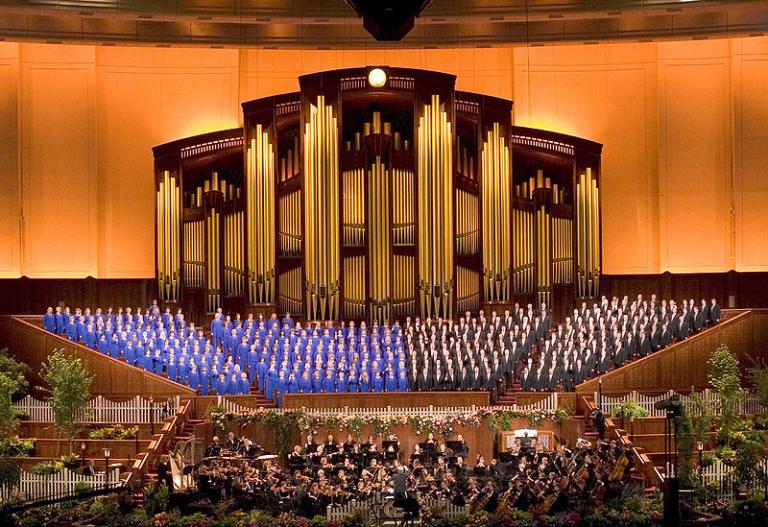
(Wikimedia Commons public domain)
If you can find about 45 minutes — of course, you can watch it in shorter increments, as well — the April 2018 “World Report” of the Church of Jesus Christ of Latter-day Saints is both very interesting and quite enjoyable, very well done:
***
I’m delighted at this news:
“Public Invited to Tour Rome Italy Temple: Open House and Dedication Dates Announced”
It’s been a very long time coming.
***
I enjoyed this retrospective, and perhaps you will, as well:
“7 Touching Conference Moments We’ll Never Forget”
***
I strongly recommend this new video (roughly 6:25 minutes long) from Book of Mormon Central:
“Evidence of the Book of Mormon: Internal Complexity”
***
The latest iteration of the Saturday Hamblin-Peterson column in the Deseret News is Easter-themed:
“The challenge of the empty tomb”
***
I mentioned the other day that, alerted by a friend, I had just joined a Facebook group called “LDS Conservatives” where, I was told, my Ensign article on Islam and I were being trashed in very harsh terms. (See “Some notes from a politically conservative Latter-day Saint Islamicist.”) I was being called, among other things, a “fool” and a “tool of Satan” — not to mention, worst of all, a “liberal.” I’m pretending to expertise on Islam that I obviously don’t possess. One woman reported that, with her husband, she had burned my article in their back yard. An angry man said that, upon receiving the copy of the Ensign containing my article, he had immediately gone to complain to his bishop, indicating that what I had written might very well kindle a “schism” — his word — in the Church.
I thought that maybe I should say something. So, disclaiming any intention to argue or contend with them, I posted a note explaining that I’m both a faithful, believing, committed, orthodox Latter-day Saint and a life-long and very serious political conservative, a believer in the Constitution, in federalism, and in free markets.
I was — despite abundant provocation — cordial, friendly, and good humored. Very deliberately so. And, though some came to my defense, I was accused of lying, of writing pro-Islamic propaganda, and even of having somehow deceived the leaders of the Church into publishing my article. President Monson was too ill to stop me, and President Nelson, at nearly 94 years of age, doesn’t understand what’s going on.
When I pointed out that I had been asked to write the article, that it hadn’t been my idea, it was demanded that I identify those who had requested it. I said that it was the leadership of the Church. “But precisely who asked for it?” came the demand. I replied that it was the same quorum that would be presiding at and conducting General Conference this weekend. “But exactly who?” Could I please identify that quorum? Well, I said, it was the First Presidency. But the demand persisted: “Exactly who?”
One wanted me to identify the precise name or names of any who had requested the article or indicated approval of it. The notion, so far as I could tell, is that there may be a faction among the Brethren — my bet would be on Europeans like Elders Dieter F. Uchtdorf and Patrick Kearon — that is aiding and abetting people who are (as one lady interestingly put it) trying to “destroy Christianity and the white race.” At least one person, though, seems to suspect that the Brethren themselves are, in whole or in part, in apostasy.
Anyway, I was eventually accused of having joined “LDS Conservatives” in bad faith. Had I not seen the question, when I joined, requiring me to pledge allegiance to President Trump? No, I had not. (I had imagined that, being both LDS and conservative, I qualified quite honestly for membership.) And then somebody discovered online evidence — I hope it wasn’t hard to find! — that I’m not an enthusiastic fan of Donald Trump. So, when I tried to access the site yesterday afternoon, I found that I had been blocked from it.
Oh well. I presume that I’m still being verbally assaulted there, and my intelligence and character denigrated, but I can no longer read what’s being said. Which, on the whole, is probably for the best.
I’m saddened, though, by the experience. Not so much for the personal attacks on me — such attacks have been the water that I swim in since I first began editing and publishing with the old Foundation for Ancient Research and Mormon Studies (FARMS) very nearly three decades ago — as for the evidence that at least some Latter-day Saints seem to be putting their political views — and perhaps even their cultural preference or, worse still, their race — ahead of the Church and the Gospel. Talk of a “schism,” and suggestions that some if not most or all of the Brethren are apostates, is genuinely depressing.
Elder Neal A. Maxwell was fond of quoting the eighteenth century English clergyman William Law, who lived his own life very heroically by this principle: “If you have not chosen the Kingdom of God first,” Law declared, “it will in the end make no difference what you have chosen instead.” And President John Taylor adopted this as his motto: “The Kingdom of God or nothing.”
I’ve long been distressed when I’ve seen people on the Left choose their politics over the Church. In recent years, though, I’ve been astonished to see that some on what might roughly be termed the Right are doing much the same thing.
In his 1911 Devil’s Dictionary, the great American cynic Ambrose Bierce offered this definition: “Christian, n. One who believes that the New Testament is a divinely inspired book admirably suited to the spiritual needs of his neighbor.”
And the fact plainly is that the scriptures are not intended only for them, those others, but for us. They’re a standing exhortation, even sometimes a rebuke, to us. And if we don’t read them that way, if we read them only as illustrating how other people have gone astray, we’re misreading them.
9 And he spake this parable unto certain which trusted in themselves that they were righteous, and despised others:
10 Two men went up into the temple to pray; the one a Pharisee, and the other a publican.
11 The Pharisee stood and prayed thus with himself, God, I thank thee, that I am not as other men are, extortioners, unjust, adulterers, or even as this publican.
12 I fast twice in the week, I give tithes of all that I possess.
13 And the publican, standing afar off, would not lift up so much as his eyes unto heaven, but smote upon his breast, saying, God be merciful to me a sinner.
14 I tell you, this man went down to his house justified rather than the other: for every one that exalteth himself shall be abased; and he that humbleth himself shall be exalted. (Luke 18)
In the first section of the Doctrine and Covenants, effectively and by design the preface to the book, the Lord plainly says that modern people have gone astray, which is plainly why the Restoration was needed:
They seek not the Lord to establish his righteousness, but every man walketh in his own way, and after the image of his own god, whose image is in the likeness of the world, and whose substance is that of an idol, which waxeth old and shall perish in Babylon, even Babylon the great, which shall fall. (Doctrine and Covenants 1:16)
It’s certainly possible to read this passage as only historical, speaking of apostate Christendom prior to 1830 and as it continues to exist beyond the walls of the Church of Jesus Christ of Latter-day Saints. But wouldn’t it be more valuable, spiritually, to read it also as a warning to ourselves?
For verily the voice of the Lord is unto all men, and there is none to escape; and there is no eye that shall not see, neither ear that shall not hear, neither heart that shall not be penetrated. And the rebellious shall be pierced with much sorrow . . . And the voice of warning shall be unto all people. (Doctrine and Covenants 1:2-4)
To offer primary allegiance to material advancement, or to lust, or to greed, or to a political party or leader, or to an ideology, or to a race, or even to a culture, to choose it instead of the Kingdom of God, is to make of it an idol, a false god.
We marvel at the silliness of many in ancient Israel who whored after the false gods of the Canaanites. How absurd to worship an idol! But the scriptures are given to us not so that we can laugh at the folly of others and feel ourselves superior. They’re given to us for our guidance, for our introspection and reflection.
I close with a passage from a conference talk given by (my co-conspirator?) Elder Dieter F. Uchtdorf:
It was our beloved Savior’s final night in mortality, the evening before He would offer Himself a ransom for all mankind. As He broke bread with His disciples, He said something that must have filled their hearts with great alarm and deep sadness. “One of you shall betray me,” He told them.
The disciples didn’t question the truth of what He said. Nor did they look around, point to someone else, and ask, “Is it him?”
Instead, “they were exceeding sorrowful, and began every one of them to say unto him, Lord, is it I?”
I wonder what each of us would do if we were asked that question by the Savior. Would we look at those around us and say in our hearts, “He’s probably talking about Brother Johnson. I’ve always wondered about him,” or “I’m glad Brother Brown is here. He really needs to hear this message”? Or would we, like those disciples of old, look inward and ask that penetrating question: “Is it I?”
In these simple words, “Lord, is it I?” lies the beginning of wisdom and the pathway to personal conversion and lasting change.












